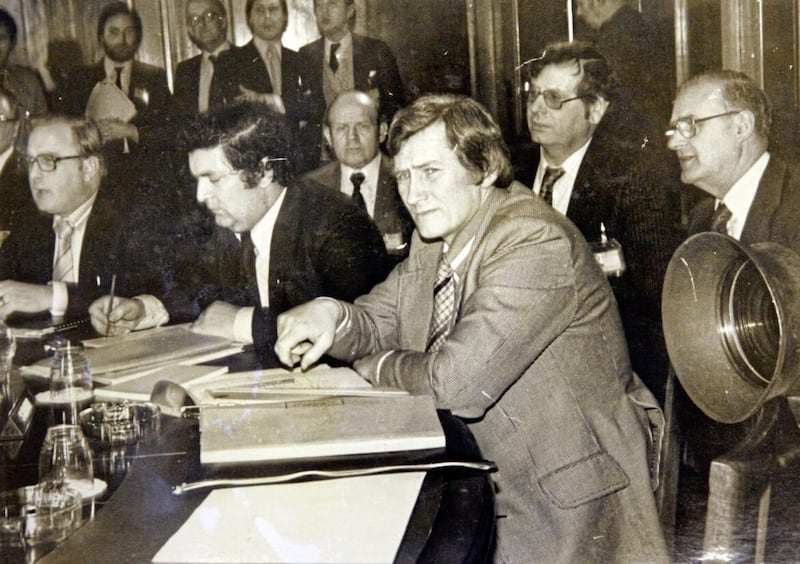April 20 1974
A proposal that a common security zone should be established on each side of the border in which British and Irish forces should be able to operate is contained in a 10-point plan recommended by the Alliance Party’s security committee for the restoration of peace.
The chairman of the committee, Lord Dunleath, suggests that both security forces would work in close cooperation with a common rear-link radio net and formally appointed liaison officers who would be in constant touch to report information and plan co-ordinated action.
Powers of arrest and detention for interrogation would be common to both sets of security forces, he said.
The party’s security committee proposes the recruitment of up to 15,000 part-time UDR, 5,000 full and part-time RUC Reserve, and 7,500 Regular RUC. The full-time strength of the UDR should also be increased. They said that the recruiting drive must be fully backed by Church and political leaders.
“All parties in the Executive and the SDLP, in particular, must make it clear that they support law and order and the only forces capable of achieving an end to violence,” Lord Dunleath states. He adds that the financial position of the full-time and part-time security forces should be improved.
He says these forces would progressively replace regular soldiers for town and country patrols, and other duties. Regular troops would be redeployed for border and coastal defence duties to prevent smuggling of arms and explosives, while a proportion will be held in reserve to act in aid of the civil power when necessary.
Regular soldiers of the British Army would also mount full-time guards at airports and harbours, while regularly patrolling beaches where landings can easily be made. Civilian air and water craft would be required to carry permits to operate.
Lord Dunleath said there was a need to step up search operations to find the weapons and materials used by the bomber and the sectarian assassin. Areas should be temporarily and rapidly sealed off and searched by the military and police working together, he suggests.
He also urges that internment should be phased out and that a permanent independent investigatory complaints tribunal should be set up to deal with complaints against police.
The Alliance Party’s Security Committee have asked for a meeting with Mr [Merlyn] Rees [Secretary of State] to discuss their proposals.
As part of wide-ranging security proposals, a common security zone for the border area was proposed by Alliance due to its porous nature and the difficulty in preventing intrusions on both sides.

Mallon: Protestant Working Class ‘Exploited’
Speaking to the North Antrim SDLP constituency council, Mr Seamus Mallon, chairman of the SDLP Assembly Party, said that one of the greatest tragedies in the political life of Northern Ireland was the callous and unprincipled way in which the aspirations of the Protestant working class people were being exploited.
Mr Mallon said: “Sectarian demi-gods like Paisley, Craig and West have manipulated the fears of these people and prostituted their sincerely held political beliefs. Rather than assuage their fears, they have fed them on an unceasing diet of sectarian hatred which has only confounded those fears.”
Mr Mallon said that at a time when all sections of the people could benefit from the radical social and economic programme being pursued by the Northern Ireland Executive, it was regrettable that Protestant working class representatives had allowed themselves to be led into the blind alley on non-participation.
These men must have recognised by now, he said, that their social consciousness and the welfare of their constituents had been sacrificed by leaders whose total lack of political acumen was only matched by their massive political egos.
“We in the SDLP say to those caught in the manacles of Paisley’s doctrine of hate – Show your courage now by shaking off his Svengali influence and help us to administer social and economic justice in this province.”


